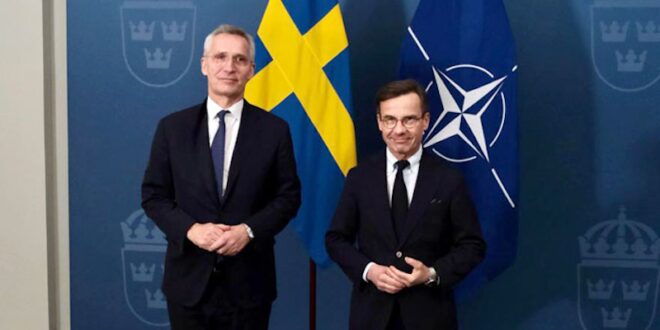Recep Tayyip Erdogan has secured another term as the President of Turkey, after the most closely fought presidential election in the last 20 years. His victory does not have only ramifications for domestic politics, but has serious implications for international politics.
One critical aspect is related to NATO’s recent expansion drive. It triggered assumptions about Sweden’s prospective trajectory towards joining NATO. Despite meeting many of Turkey’s demands and receiving significant engagement from the United States and NATO’s secretary general, Sweden and Finland are still facing obstruction from Turkey, who continues to block its accession to the NATO alliance..
The crisis in Ukraine has led many nations to seek refuge with NATO, and Sweden is considering the possibility as well, but Erdogan is opposed to it. Erdogan’s win has raised concerns about Sweden’s security concerns, glued to its pending NATO membership. As the European nations, especially those that share boundaries with Russia, perceive mounting threats and growing geopolitical dynamics, the question of Sweden’s potential pursuit of NATO membership has become a highly contested issue. Turkey, a NATO member since 1952, possesses the alliance’s second-largest military, housing 50 American nuclear warheads and serving as a crucial air base for NATO operations
Sweden’s Neutrality, Erdogan’s Duplicity
Sweden has traditionally pursued a policy focusing on neutrality and self-reliance to safeguard its interests. However, the rising tensions between Russia and NATO, along with Russia’s assertive actions in the Baltic Sea region, have prompted a reassessment of Sweden’s security strategy.
Turkey accuses Sweden of supporting Turkey’s Kurdish Workers’ Party (PKK) designated as a terrorist organization by the many nations. While Sweden denies supporting the PKK directly, but acknowledges support to other Kurdish groups. President Erdogan has also strongly objected to Quran Burning in Sweden by protestors.
Erdogan’s attitude towards the Kurds is exceptionally inflexible and intolerant, fueled by his party’s poor performance in parliamentary elections in 2015’s elections and his populist and nationalist beliefs.
A report of the Office of the United Nations High Commissioner for Human Rights estimates that the Turkish military has led to the forced displacement of approximately half a million Kurds and caused the death of no less than 6,561 Kurds in either violent clashes or terrorist attacks. Erdogan Recep applies a double standard to issues of insurgency, national security, terrorism, and human rights violations. Yet, when comes the issue of perpetrating gross violence or human rights violations against Turkish Kurds, his approach differs one he demonstrates on reasons to stall Sweden’s NATO membership and treat India’s Kashmir as a conflict zone.
Sweden’s NATO Pathway Uncertain due to Erdogan’s Authoritarian Re-endorsement at Home
Erdogan’s consolidation of power, reflected in his re-election, has weakened Turkey’s commitment to Western values. Instead of prioritizing Turkey’s foreign policy and economy, Erdogan is expected to place more emphasis on shaping his own legacy, a “coherent ideological formula, i.e., “Erdoganism” contradictory and antagonistic to Kemalism, a source of a secular and modern turkey.
Another factor contributing to the speculation is the deteriorating relationship between Turkey and Western nations, particularly within NATO. Erdogan’s controversial policies, such as the crackdown on dissent, the imprisonment of journalists, and Turkey’s military interventions in Syria, have strained Turkey’s relations with its NATO allies.
Russia’s Assertiveness in the Baltic Sea Region
The Baltic Sea region, where Sweden is geographically located, has experienced heightened tensions due to Russia’s assertive actions. Sweden, which is not a NATO member, has observed an increase in Russian military activities in the region, including airspace violations and simulated attacks.
In response, Sweden has bolstered its defense capabilities and strengthened cooperation with NATO through enhanced partnerships, such as the Host Nation Support Agreement. However, the situation remains fragile, and some argue that NATO membership would provide a more robust security guarantee for Sweden in the face of these threats. This is also going to reinforce Russia’s vulnerable security dilemma, as reiterated frequently.
The Fragile Security versus The Dilemma of Abandoning Neutrality
Proponents of Sweden’s potential NATO membership argue that aligning with the alliance will provide NATO’s military capabilities, including intelligence sharing, joint exercises, and a stronger deterrent against potential adversaries. Though, while Erdogan’s home victory may liberate him from nationalist considerations, potentially leading to Sweden’s NATO membership. Yet, there is a chance he may be motivated by his success to pursue a more religious and Ottoman-influenced approach in international politics.
However, joining NATO would require Sweden to abandon its traditional neutrality policy, a cornerstone of its foreign policy for decades. Sweden has to consider Turkey’s key diplomatic demands and negotiate with its unyielding self-possession with issues that are weakening democracy and human right conditions in Turkey. Scandinavian countries Norway, Finland and Sweden occupy top ranks in terms of the human freedom, transparency or human development
Debating the Prospects of Sweden’s NATO Membership
The possibility of Sweden joining NATO has been brought up following Erdogan’s success in Turkey. The changing security landscape, Russia’s assertiveness, and Erdogan’s increasing authoritarian tendencies have prompted debates about Sweden’s possibility of joining NATO.
Erdogan’s foreign policy choices if reinforced by domestic forces may diverge from NATO’s collective security objectives and strategic interests. This misalignment may further complicate Sweden’s decision regarding NATO membership as well as ultimately, Erdogan’s continued leadership could introduce uncertainties and challenges in Turkish foreign policy that may further complicate its relations with NATO members and jeopardize puissance of NATO’s Eurasian flank.
 Eurasia Press & News
Eurasia Press & News




